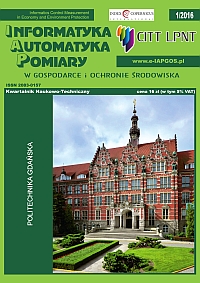THREE-DIMENSIONAL MODELLING OF THERMAL STRESSES IN A PLANAR SOLID OXIDE FUEL CELL OF A NOVEL DESIGN
Article Sidebar
Issue Vol. 6 No. 1 (2016)
-
MODELOWANIE – UMIEJĘTNOŚĆ CZY SZTUKA?
Krzysztof Kluszczyński4-15
-
GLOW RADIATOR CO2
Jan Kubicki16-20
-
MACHINE TRANSLATION WITH JAVANESE SPEECH LEVELS’ CLASSIFICATION
Andrew Nafalski, Aji Prasetya Wibawa21-25
-
DEVELOPMENT ISSUES IN ALGORITHMS FOR SYSTEM LEVEL SELF-DIAGNOSIS
Victor Mashkov, Andrzej Smolarz, Volodymyr Lytvynenko26-28
-
MODELLING OF VERTICAL SOIL COLLECTORS OF THERMAL PUMPS
Bogdan Sydorchuk, Oleksandr Naumchuk29-31
-
MODELLING AND AUTOMATION OF PROCESS OF WATER PURIFICATION BY MAGNETIC FILTER
Andrii Safonyk32-36
-
FLAME MONITORING USING IMAGE CLASSIFICATION
Daniel Sawicki37-40
-
TWO PHASE GAS-LIQUID FLOWS RECOGNITION USING FUZZY INFERENCE
Paweł Fiderek, Radosław Wajman, Jacek Kucharski41-43
-
ANALYSIS OF CORRELATION AND SPECTRAL CHARACTERISTICS OF FRACTAL COMB-STRUCTURED SIGNALS
Ruslan Politanskyi, Andrij Veryga44-46
-
SELECTION OF COMPENSATION WIND FARM EQUIPMENT CONNECTED TO THE NETWORK 110 KV
Paweł Pijarski, Michalina Gryniewicz-Jaworska47-50
-
VIBRATION REDUCTION OF NONLINEAR OBJECT WITH AN ADAPTIVE PROPORTIONAL-DERIVATIVE CONTROLLER WITH A MRAS STRUCTURE
Mariusz Ostrowski, Wojciech Jarzyna51-54
-
EMERGENCY SWITCHING AND ANALYSIS OF THE TRANSIENT STATES OF AN INTERLEAVED CONVERTER
Katarzyna Przytuła55-58
-
DYNAMIC POWER CONTROL OF THE GRID CONVERTERS
Dariusz Zieliński59-62
-
ASSESSMENT OF THE MAXIMUM ELECTRIC FIELD INDUCED BY AN EXTERNAL MAGNETIC FIELD
Tomasz Lisewski, Agnieszka Mikołajczyk, Stanisław Abramik63-65
-
INTERACTIVE, MULTIFUNCTIONAL MIRROR – PART OF A SMART HOME
Szczepan Paszkiel, Robert Kania66-68
-
THREE-DIMENSIONAL MODELLING OF THERMAL STRESSES IN A PLANAR SOLID OXIDE FUEL CELL OF A NOVEL DESIGN
Tomasz Zinko, Paulina Pianko-Oprych, Zdzisław Jaworski69-72
Archives
-
Vol. 8 No. 4
2018-12-16 16
-
Vol. 8 No. 3
2018-09-25 16
-
Vol. 8 No. 2
2018-05-30 18
-
Vol. 8 No. 1
2018-02-28 18
-
Vol. 7 No. 4
2017-12-21 23
-
Vol. 7 No. 3
2017-09-30 24
-
Vol. 7 No. 2
2017-06-30 27
-
Vol. 7 No. 1
2017-03-03 33
-
Vol. 6 No. 4
2016-12-22 16
-
Vol. 6 No. 3
2016-08-08 18
-
Vol. 6 No. 2
2016-05-10 16
-
Vol. 6 No. 1
2016-02-04 16
-
Vol. 5 No. 4
2015-10-28 19
-
Vol. 5 No. 3
2015-09-02 17
-
Vol. 5 No. 2
2015-06-30 15
-
Vol. 5 No. 1
2015-03-31 18
-
Vol. 4 No. 4
2014-12-09 29
-
Vol. 4 No. 3
2014-09-26 22
-
Vol. 4 No. 2
2014-06-18 21
-
Vol. 4 No. 1
2014-03-12 19
Main Article Content
DOI
Authors
Abstract
The presented modelling investigation was carried out to analyze thermal stresses and expansion in an anode supported planar Solid Oxide Fuel Cell (pSOFC). The temperature distribution was based on previously developed thermo-electrochemical model predicting fuel cell operation. The design of a single pSOFC consisted of three ceramic layers of membrane electrode assembly: anode, electrolyte, cathode and two cross-flow bipolar plates with 26 ribs. The gases flowed diagonally from one cell corner to the opposite one. The fuel and air flows were cross-wise opposed on each bipolar plate side. The study allowed to indicate the most vulnerable to thermal damage area of the fuel cell in the operating conditions. The results will be useful in further design modification and performance optimization of the SOFC.
Keywords:
References
Bossel U.: Rapid startup SOFC modules, Energy Procedia, 28, 2012, 48–56.
Brochure of Anderman Industrial Ceramics Ltd. Zirconia Yttria Stabilised, 2014.
Brochure of ThyssenKrupp VDM, Crofer 22 APU, Material Data Sheet No. 4046, May 2010.
Cui D., Cheng M.: Thermal stresses modeling of anode supported micro-tubular solid oxide fuel cell, Journal of Power Sources, 192, 2009, 400–407.
Delette G. et al.: Thermo-elastic properties of SOFC/SOEC electrode materials determined from three-dimensional microstructural reconstructions, International Journal of Hydrogen Energy, 38, 2013, 12379–12391.
Laurencin J. et al.: A numerical tool to estimate SOFC mechanical degradation: Case of the planar cell configuration, Journal of the European Ceramic Society, 28, 2008, 1857–1869.
Li J., Lin Z.: Effects of electrode composition on the electrochemical performance and mechanical property of mico-tubular solid oxide fuel cell, International Journal of Hydrogen Energy, 37, 2012, 12925–12940.
Lin Ch. K., Chen T. T., Chyou Y. P., Chiang L. K.: Thermal stress analysis of a planar SOFC stack, Journal of Power Sources, 164, 2007, 238–251.
Nakajo A. et al.: Modeling of thermal stresses and probability of survival of tubular SOFC, Journal of Power Sources, 158, 2006, 287–294.
Peksen M.: 3D transient multiphysics modelling of a complete high temperature fuel cell system using coupled CFD and FEM, International Journal of Hydrogen Energy, 39, 2014, 5137–5147.
Pianko-Oprych P., Zinko T., Jaworski Z.: Simulation of the steady-state behaviour of a new design of a single planar Solid Oxide, Polish Journal of Chemical Technology, 2016, 18, 1, [DOI: 10.1515/pjct-2016-0011].
Singhal S. C., Kendall K.: High temperature solid oxide fuel cells: fundamentals, design and applications, Elsevier Science, 2003.
Qu Z., Aravind P. V., et al.: Three-dimensional computational fluid dynamics modeling of anode-supported planar SOFC, International Journal of Hydrogen Energy, 36, 2011, 10209–10220.
Article Details
Abstract views: 274
License

This work is licensed under a Creative Commons Attribution-ShareAlike 4.0 International License.






